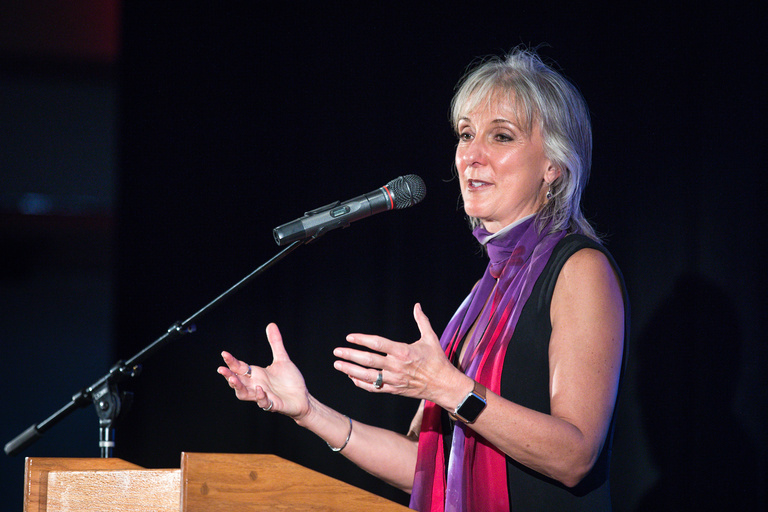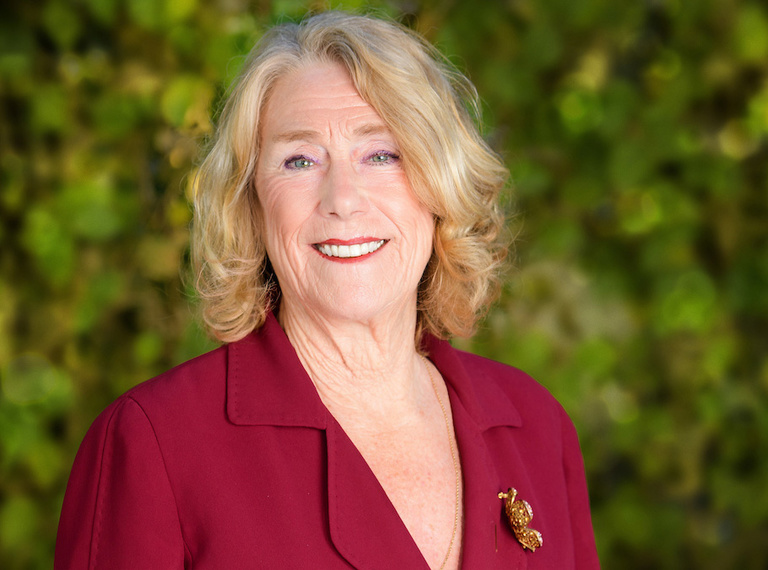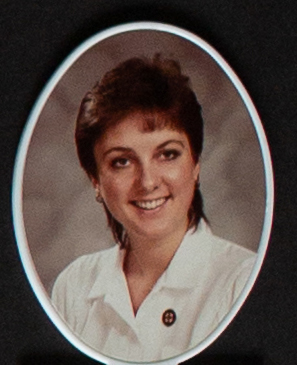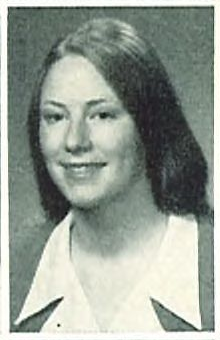Judith Karshmer, PhD, PMHCNS-BC, FAAN, is Dean of Arizona State University’s Edson College of Nursing and Health Innovation. A 1970 graduate of the College of Nursing BSN program, Karshmer joined ASU as dean in 2018.
Teri Pipe, PhD, RN, is dean emerita of Arizona State University’s Edson College of Nursing and Health Innovation. A 1985 graduate of the College of Nursing BSN program, Pipe was dean from 2011–2018.
Dr. Pipe and Dean Karshmer joined us over Zoom for a conversation on nursing leadership. The conversation has been edited for length and clarity.
Please share your trajectory from the UI College of Nursing to where you are today.

Teri Pipe: I entered the College of Nursing as a second-year transfer student and loved being there. I was from a small town, Indianola, Iowa, and it was mind boggling to me how big the university was. I worked as a nursing assistant at the hospital, in the pediatric orthopedic unit, and had the great experience of learning about nursing from an excellent team. I had excellent professors and clinical oversight. Some of the names that come back to me are Marty Craft-Rosenberg, Kitty Buckwalter, Joe Eland, and Pat Donohue.
The dean at the time was Geraldene Felton, and even just saying her name makes me want to stand up straighter. She was amazing and strong, and she told us all as students that we would be leaders. Of course, we didn't really take that I think as seriously as she meant it, but she was absolutely right.
That hunger for education and excellence was really rooted deep in me at the University of Iowa, and I just had this thirst to keep going.
Teri received a master’s from University of Arizona, and PhD from Penn State. She was faculty at Grand Canyon University, and then Director of Nursing Research and Innovation at Mayo Clinic in Arizona for eleven years. After six months as interim dean, she served as dean for seven years. She became the chief wellbeing officer and founded the Center for Mindfulness, Compassion and Resilience during that time.
Then, the wonderful transition happened. I decided that I no longer really wanted to be dean. I really wanted to step aside and let somebody else lead, and fabulous Judy Karshmer stepped up to the plate.

Judy Karshmer: I'm also from a small town – Eldora, Iowa. I always wanted to be a nurse. I didn't really think of any other option, quite frankly. It was sort of like, nurse or teacher. At the time, most people went to diploma programs, and I was determined to go someplace [with] boys, and football, and fun things to do. I decided I'd go to Iowa, not even with any idea what that meant.
[My junior year] I decided, ‘this isn't what I thought it was going to be. I don't want to be a nurse. I don't like it at all.’ I went to change my major, only to find out that you had to have two years of a foreign language in every major but nursing. So, I decided ‘I'll just finish out the nursing degree and then I'll go find something.’
I started my senior year, and we did psych nursing in the old psych hospital, and - I'll never forget this - they took us on to the unit, locked us in, and I felt like I had come home. I loved it. I sat and I talked to the patients. I had a fabulous time. I knew right then that I wanted to get a graduate degree in psychiatric nursing.
Judy received a master’s degree from Rutgers and a PhD from New Mexico State University. Prior to becoming dean, she was associate dean at University of South Florida for six years and dean at University of San Francisco for ten years.
How did the UI College of Nursing prepare you for leadership excellence?

Teri Pipe: There are some clear things, but I do want to emphasize that I did not have this perspective when I graduated; this has come in the years hence.
One of the courses that I took early on was health promotion. Kitty Buckwalter taught it and gave an overview of health promotion practices and why they're important. The focus was on us, as students. That was really a different way to think about students and a different way to help students understand that when well-being is important for you, as a student, it is also important for your patients. That within the nursing paradigm, we think of humans as whole people, with social, physical, mental, and emotional, and more wrapped together. I think that was really, really important for me as a person. I didn't have any skill set in terms of my own personal well-being, and that class was really eye opening to me in terms of my own health and how important it was as a student.
The other thing that comes to mind is Pat Donohue’s course on the history of nursing. I'll never forget the first day of class when she walked in with a wig on, a mini skirt, and very dangly funky earrings. She was chewing gum and exhibiting what we would think of as non-professional behaviors. (This is mid-80s, so things have changed in terms of our expansiveness of belonging, and what we consider professional now.) It gave us this great context of when you present yourself, you have about one second to make a first impression. And when you walk into a patient room or home, you are that person's environment and what you bring with you matters to them; for their health, for how they feel, and how much they'll trust you. She did it in a very creative way and made a really strong impression. I think as a faculty member that has stuck with me - that when you teach students, you need to find creative ways to do it, because it's not all about the cognition when it comes to learning. It's also about the set and the stage that you create as the instructor.

CON senior photo, 1970
Judy Karshmer: I had the good fortune when I was in college to be in the sorority, which was actually good prep for leadership because it allowed me to take on relationships with students, older and younger, and that gave me a chance, in a very safe, informal way, to learn. I will often say that that was one of the best trainings I ever had for my leadership roles in nursing. It gave me the confidence in a small group to be a leader, such that I was pledge trainer in my junior year and the president of the Student Nurses Association. I did that because my friends and colleagues who were in my sorority said, ‘Judy, you could do that, that'd be great’.
I had great opportunities as president of the nursing student association. I had one-on-ones with the dean and talked to faculty in a different way because I was the student rep on the curriculum committee and the fundraising committee. I helped publish the student nursing newsletter, which got me in contact with all the other organizations at the university. All of those gave me the confidence that when I knew I wanted to be a psych nurse, I felt I could go straight to graduate school. At the time, there were only two schools in the country that allowed you to go straight on for your master's degree without two years of experience. I didn't feel the people saying, ‘you can't do that, you won't be successful.’ My two psych instructors said, ‘you can do it, and I will write you a letter of recommendation’. So for me, it set me up for a confidence that I would have never had otherwise.
What are your leadership philosophies? Do you have anything that you try to live by as nurse leaders or as academic leaders?
Teri Pipe: For me, it's a little bit linked with just my perspective on life in general and my approach is that I accept people as they are and believe that they are becoming. I dream with them, I see potential, and I see that they're not done yet. I think that I can have both realities. People and groups and organizations can be accepted as they are, and we don't stop there. We become better and stronger and bolder. And I think that’s the way I encounter myself. I accept myself now, but I know that I'm not done yet; I continue to grow and expand and learn. I expect the people that I lead to also be in that becoming process.
Judy Karshmer: As a leader, my responsibility is to create the environment where people feel safe enough to fail. That means they can try things out and they're not going to get nailed for it. That’s really important.
[It’s also] very important to be able to demonstrate that you change your mind. One of the things I try to actively do is, [when I] make a decision I call it today's best thinking. Today, that was the best decision, but when we find out something different tomorrow, we need to be able to say, ‘I changed my mind’. I try to model ‘you're right, I'm wrong, I change my mind.’ Once you do that, it invites the rest of your team to also do that.
It’s unique that you were both in the position of dean at ASU, and one came right after the other. Could you talk a little bit about what you've learned from each other, what you've seen from each other as leaders, or great accomplishments at ASU?
Teri Pipe: Leadership transition can be really jarring for the organization, and I think that Judy and I did it pretty well.
I saw her take her time with the changes that she made. She did what we call the nursing process. She did assessment first, figuring out what problems needed to be fixed, and then she made a plan and went ahead and fixed it. Her first priority was people in the organization, getting to know the college, and taking care of the college first. Then asking the really, really important questions: Why did we do this? What are we doing here? Asking those questions as a way to build the foundation for her leadership. Then, watching her take programs and either change them, update them, or do away with them in a way that makes sense for the future moving forward. It feels like there's been an unbroken chain of leadership there. It's good for the organization, I think, and the students and the staff and the faculty.
Judy Karshmer: Teri has this presence of calm and creates this safe, calm place. And that's how I felt when I came into the position. There was no competition. There was no, like, are you going to change things that I've been doing? It was calm, it was smooth. I did have the good fortune of coming monthly for a few days for a six-month period before I took the position to get to know the faculty and staff in the college. I had no agenda. I wasn't the dean, I didn't have to make any decisions, but I got to meet with everybody in the college and ask them to tell me about the college, what we do well and what we could do differently. It was a wonderful way to get to know the college because I just got to talk to them. It was lovely. I've made transitions before and I've never had that kind of smooth landing, ever.
There’s a big Iowa connection at Arizona State. Our president did his undergraduate work at Iowa State, our Dean of the College of Arts and Sciences went to Iowa, our associate dean here in the College is from Iowa. There's a big Iowa sort of connection, and part of it is because it was way too cold in Iowa, but it creates a sort of – this is going to sound so stereotypical – but it's got that sort of like, Midwestern kind of [attitude], ‘we can do this without getting too ruffled’.
Anything else?
Teri Pipe: I would not have been in nursing school had it not been for scholarships and philanthropy. So, I would just say to those who are able to give, if they could give to nursing scholarship or to the college more broadly, that's a really strong investment in people. I certainly wouldn't have been able to go to school had other people not helped me out that way. So that's really important for me to pass that along.
Judy Karshmer: One little story: When I was in school, there was no public transport for getting to clinicals across the river, so we stood on the corner every morning hitchhiking, with our nursing caps in a little plastic bag. We stood on the corners and groups of people going to the hospitals would just pick up these three or four nursing students every morning. It was a nightmare when you think about, but we just all did it and it was the norm.
We are looking to feature a wide variety of CON alumni in leadership roles during our 125th anniversary year. If you know of an alum in leadership, please submit their information here.